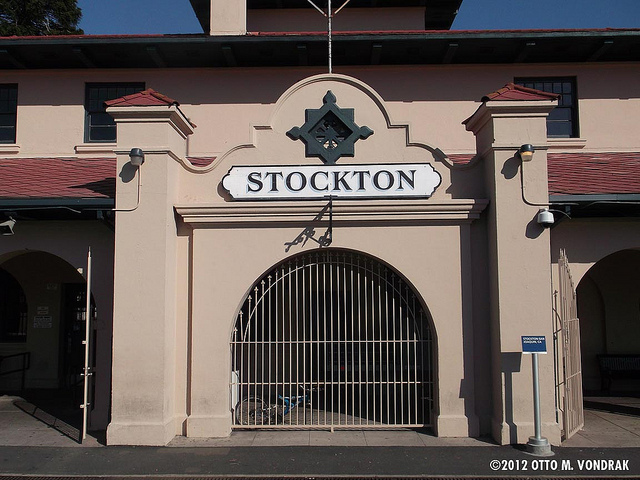Facing a July 8 trial decision that could wipe out most of its public employee pension benefits, the City of Stockton filed a revised bankruptcy restructuring plan last week that converts $544 million in life-time retiree healthcare benefits to a one-time payment of $5.1 million.
Stockton filed for bankruptcy on June 28, 2012 because it essentially missed payroll. During a real estate boom, the city had accumulated huge liabilities from wage increases, public employee pension spikes, granting life-time retiree medical benefits and taking on large amounts of municipal bond debt to build sports and entertainment venues.
Stockton originally negotiated friendly agreements with all city unions, retirees and other major creditors, including two insurers of the city’s largest bond issues, who originally opposed the city’s eligibility for bankruptcy. The city’s initial plan filed on November 22, 2013 retained all public employee benefits, but eliminated 99% of the $35 million in secured bond debt held by two Franklin mutual bond funds for a one-time cash payment of $350,000.
Franklin sued the city in bankruptcy court on the basis that their bonds “secured” by two golf courses and a park should be paid ahead of any “unsecured” public employee benefit for pension or healthcare claims. The bondholders pointed out that their treatment was unfair because other creditors receive what they are owed and the largest creditor, California Public Employees Retirement System (CalPERS) is untouched.
Federal Judge Christopher Klein quickly ruled that public employee life-time retirement healthcare claims are unsecured. After conducting a two-week trial to determine if pension claims by CalPERS should be paid before secured city bonds owned by two Franklin mutual funds, Judge Klein said he would rule on the issues by July 8.
With the clock counting down to a historic ruling that could set a precedent and wipe out tens of billions of dollars of luxurious pension benefits negotiated by California public employee unions, the City of Stockton filed a revised plan of reorganization that wiped out 99% of its $544 million in public employee life-time healthcare liability with a one-time payment of $5.1 million.
The revised plan for the first time recognized the two Franklin mutual funds as a secured “creditor class” with collateral in two golf courses and a park. The city’s plan states that after the bankruptcy judge establishes a value for Franklin’s collateral, the city should have the right to “choose one of three options: full payment, full payment over time, or transfer of the property” to Franklin.
Stockton argued at trial that the two money-losing golf courses and the park have little or no value due to zoning restrictions and other factors. But Franklin’s real estate expert said that one golf course property was worth nearly $15 million.
Franklin’s attorney James Johnston argued during the trial that Stockton’s plan, which builds a large reserve and understates revenue, will have enough money to pay both Franklin and the full CalPERS pension obligations. “This isn’t a case of inability to pay; it’s unwillingness to pay.”
Despite the city’s new efforts to come to an agreement with Franklin, Judge Klein said he may make a “clarifying ruling” on the general issue of whether public pensions issued through CalPERS can be cut in bankruptcy, and he expected to rule on Franklin’s collateral values before the July 8.
In what can only be interpreted as an ominous sign for the public employee unions, Judge Klein made a reference to the CalPERS contention that it’s “an arm of the state” protected by federal law in bankruptcies.
Klein previously has said that with Stockton currently burdened with a $29 million a year payment to CalPERS, and debt service that ballooned from $3 million to $17.2 in just six years he will not want to confirm an “inadequate debt-cutting plan” that could lead to a second bankruptcy. He mentioned reports that Vallejo did not cut pensions in bankruptcy and now faces deficits despite a 1-cent sales tax increase.
U.S. Judge Steven Rhodes ruled on December 3, 2013 in the City of Detroit Chapter 9 municipal insolvency that public employee pensions can be cut in bankruptcy. In a CalPERS court brief backing an appeal of the ruling, CalPERS argued the ruling nullifies section 903 of the bankruptcy code that “expressly preserves state laws governing its creatures.” CalPERS brief argued that the ruling was “not absolutely necessary” to determine Detroit’s eligibility for bankruptcy, and therefore is an “improper advisory opinion.”
CalPERS’ attorney Michael Gearin said at the Stockton bankruptcy trial that none of the parties in the trial have asked to impair or cut CalPERS obligations. He asked Judge Klein not to make an unnecessary ruling on the impairment of pensions and to wait until impairment becomes an issue. Gearin said a ruling would trigger a costly legal battle.
Stockton has spent $13.9 million on the bankruptcy since it was filed two years ago, a report filed last week said. The law firm of Orrick, Herrington and Sutcliffe received $10.4 million, which includes $500,000 to $1 million for consultants and vendors. But with Judge Klein about to make a ruling that could devastate CalPERS, expect some hot negotiations over the next month.

COMMENTS
Please let us know if you're having issues with commenting.